Community for world's top scientists envisioned in Shanghai


The World Laureates Forum is held in Lingang, Shanghai, Oct 29, 2018. [Photo/Xinhua]
Shanghai plans to establish the country's first scientific community for the world's top scientists, offering both innovative labs and high-quality lifestyles to help develop ideas on the frontier of knowledge and have research projects incubated and implemented.
The project, a joint effort by the Hong Kong-based World Laureates Association, the Lingang administration committee and the State-owned Lingang Group, was announced on Monday during the ongoing World Laureates Forum held in Lingang, Shanghai.
The annual forum, also jointly launched by the three parties, gathers the world's leading scientists and entrepreneurs to discuss ways of establishing scientific cooperation and applications to address important issues such as human health and environmental problems.
A total of 26 Nobel Prize laureates and other world-class award winners and more than 30 academicians with the Chinese Academy of Sciences and the Chinese Academy of Engineering and young leading scientists from home and abroad are participating in the event, which ends on Wednesday.
"The scientific community is tailor-made for diverse needs of winners of top scientific awards, including the Nobel Prize, the Turing Award and the Wolf Prize, and will be based on establishing joint labs with local universities, scientific research institutes and enterprises," said Weng Wei, vice-chief economist of Lingang Group, at the forum.
WLA will introduce the world's top-notch scientists mainly in the fields of life sciences, artificial intelligence and marine technology to Shanghai to promote the implementation and industrialization of relevant projects.
"Some of the research results of the laureates are in the basic research stage and still require effort and time to be transferred to applications," said Wang Hou, secretary-general of WLA.
Backed by China's enormous application market, Shanghai's Lingang port area, a key zone in the city's attempt to become a scientific innovation center with global influence, serves as a "perfect host" for both the forum and the transformation from research to application, Weng said.
The community, which is still in the planning phase, will comprise three key functional areas - brainstorming, labs and technology transfer - and will also involve banks and other funding agencies, according to the Lingang Group.
Thomas Sargent, laureate of the 2011 Nobel Prize in Economics, said scientists like to get together to talk and argue, and the local government's strong interest and support in setting up such a community is attractive.
Zhang Jie, an academician of the Chinese Academy of Sciences and former president of Shanghai Jiao Tong University, a co-organizer of the forum, said that after 40 years of development since reform and opening-up, China possesses the potential to become a leader in the new era of scientific and technological renovation.
"The dialogue between the world's top scientists and the Chinese scientists, and the world's top scientists' participation in communications with local professional communities, will play a key role in better cultivating an environment for the country to maintain that potential," he said.
Lin Zhongqin, an academician of the CAE and president of Shanghai Jiao Tong University, said that some of the forum participants will give lectures at the university.
"I believe close contact with science masters will inspire a younger generation of teachers and students to be further devoted to their studies and research," he said.
MOST POPULAR
- 1 $39.7 billion worth of deals inked at Airshow China
- 2 China announces tax relief measures to stabilize real estate sector
- 3 A look at China's economy in October, 2024
- 4 Public holiday extension announced
- 5 China's NEV annual production hits 10 million milestone amid global carbon reduction efforts
Editors' Picks
 Infographic:
A look at China's economy in October, 2024
Infographic:
A look at China's economy in October, 2024
 Infographic:
G20 at a glance
Infographic:
G20 at a glance
 Video:
Peru sees new port open
Video:
Peru sees new port open
 Infographic:
China's public holidays for 2025
Infographic:
China's public holidays for 2025
 Infographic:
Basic facts of APEC
Infographic:
Basic facts of APEC


